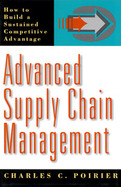2008
Supply chain management-the means by which firms engaged in creating, distributing, and selling products can join forces to establish a supply network with an unbeatable competitive advantage-has emerged as one of the most powerful business-improvement tools around. Companies all over the world are pursuing supply chain as the latest methodology to reduce costs, increase customer satisfaction, better utilize assets, and build new revenues. In this fiercely competitive environment, the gap between firms that are succeeding and those that aren't is rapidly expanding. In Advanced Supply Chain Management, leading expert Charles Poirier presents the four levels of accomplishment that separate the successful firms from the "wannabes." He details these four levels, from the beginning stages to the most advanced techniques and processes. Each level is described in detail so a firm can calibrate itself and determine what work remains to be done to close the gap.
Many firms are stuck in the first stage of supply chain management, marked by a myopic internal focus that may result in great short-term results but often misses the mark in the increasingly important global marketplace. Poirier outlines the process by which aggressive firms graduate through the next three stages, moving from an internal focus to an external one as they partner with suppliers and customers, first to achieve savings, then to build a special advantage within a specific market.
Firms that reach the fourth stage learn how to establish the external alliances necessary to build the essential networks. Poirier provides a model for building this advanced stage, including the construction of value chain constellations that deliver benefits that elude lower-level competitors and the implementation of communications Intranets, Internets, and privileged Extranets. He also includes action studies that illustrate what has worked for companies around the world, what has not, and why.
By demonstrating how successful firms have achieved their high status and describing the process it takes to reach their level, Advanced Supply Chain Management gives readers the means to calibrate their own progress and determine a more proactive and cooperative plan for becoming the first in their industry to attain supply chain excellence.
- The recognized expert on supply chain management describes how a company can construct the value chain constellation necessary to achieve market dominance
- Explains a totally new model that builds supply chain excellence around a "nucleus organization"
- Rich in case studies that illustrate what works, what doesn't, and what the leading companies are doing to succeed
Too many of us have become addicted to the popular, enticing, and dangerously misleading drug of multitasking. Consultant Devora Zack was once hooked herself, but she learned how to beat it—and became more efficient as a result. With this video workshop, you too will learn how to beat the multitasking addiction.
Zack presents convincing neuroscientific evidence that proves you really can’t accomplish more by tackling several things at once—it’s simply an illusion. There’s a much better way to deal with all the information and interruptions that bombard us today.
Learn how to clear and calm your mind, arrange your schedule and environment, and gently yet firmly manage the expectations of people around you. You’ll discover how to accomplish a succession of tasks, one by one, and be infinitely more productive.
Improve your relationships, creativity, mental discipline, focus, and accuracy
Discover how the Singletasking Principle relates to your inner and outer worlds
Explore Scattered Brain Syndrome and gain strategies to fight back against “Enemies of the Here and Now”
Apply Singletasking on the job, with techniques such as Clustertasking, Laidback Lunch, Choose and Commit, and Teaching your Phone to Heel
Dive into non-work applications of Singletasking, including how to recharge relationships
Learn the measurable value of self-reflection, and gain techniques that help you unplug
Devora Zack, CEO of Only Connect Consulting, is a global keynote speaker, consultant, and coach with 100+ clients such as Cornell University, Smithsonian, Australian Institute of Management, U.S. Department of Education, and Mensa. Her books, Singletasking, Networking for People Who Hate Networking, and Managing for People Who Hate Managing, are published in over 25 languages. She has been featured on ABC-TV, Fox Business, USA Today, Wall Street Journal, Forbes, and Fast Company.

We don’t have to live with regret about what we could have said or how we should have listened. This timely, timeless bravery manual teaches which risks to take and how to engage in ways that don’t cost us our personal peace.
Michelle’s tips read like a heartfelt conversation with a trusted friend—one who happens to have decades of experience coaching people from all walks of life. When we fall into sneaky, fear-based patterns, we’re robbed of the joy of communicating skillfully and confidently. Readers of Communicate with Courage learn how to overcome four hidden challenges:
- Hiding: Avoiding risks we need to take to realize our potential
- Defining: Needing to be right rather than approachable and open
- Rationalizing: Shielding ourselves from honest feedback, conflict, apologizing, asking for help, negotiating, and other scary but potentially rewarding Pro Moves
- Settling: Accepting "good enough" instead of stretching toward better outcomes
- Best Book Nonfiction, Outstanding Education – Independent Author Network
- Nonfiction 1st Place and Best Book Nonfiction – PenCraft Book Awards
- Nonfiction in Leadership/Think Differently Winner – Goody Book Awards
- Bronze Nonfiction Award – Readers’ Favorite Awards
- Communications Nonfiction Gold Prize – Global eBook Awards
- Nonfiction Book of the Year, Grand Prize – Independent Author Network
“Communicate with Courage is life-changing. Gladieux’s extraordinary empathy shines through with relatable examples from diverse worlds, from music to business to sports. You’ll read this book more than once. It will transform your relationship with yourself and other people.”
—Dr. Jillian Ihsanullah, leadership researcher
Dialogic Organization Development is a compelling alternative to the classical action research approach to planned change. Organizations are seen as fluid, socially constructed realities that are continuously created through conversations and images. Leaders and consultants can help foster change by encouraging disruptions to taken-for-granted ways of thinking and acting and the use of generative images to stimulate new organizational conversations and narratives. This book offers the first comprehensive introduction to Dialogic Organization Development with chapters by a global team of leading scholar-practitioners addressing both theoretical foundations and specific practices.
Edgar Schein consulted to DEC throughout its history and so had unparalleled access to all the major players, and an inside view of all the major events. He shows how the unique organizational culture established by DEC's founder, Ken Olsen, gave the company important competitive advantages in its early years, but later became a hindrance and ultimately led to the company's downfall. Schein, Kampas, DeLisi, and Sonduck explain in detail how a particular culture can become so embedded that an organization is unable to adapt to changing circumstances even though it sees the need very clearly.
The essential elements of DEC's culture are still visible in many other organizations today, and most former employees are so positive about their days at DEC that they attempt to reproduce its culture in their current work situations. In the era of post-dot.com meltdown, raging debate about companies "built to last" vs. "built to sell," and more entrepreneurial startups than ever, the rise and fall of DEC is the ultimate case study.
• Edgar Schein is one of the founders of the organization development field, a widely respected scholar and a bestselling author
• Shows how the unique culture of DEC was responsible both for its early rise and for its ultimate downfall-a real-life classical tragedy
• Schein was a high-level consultant to DEC throughout its history, with unparalleled access to the company's story as it unfolded over the course of four decades
DEC Is Dead, Long Live DEC tells the 40-year story of the creation, demise, and enduring legacy of one of the pioneering companies of the computer age. Digital Equipment Corporation created the minicomputer, networking, the concept of distributed computing, speech recognition, and other major innovations. It was the number two computer maker behind IBM. Yet it ultimately failed as a business and was sold to Compaq Corporation. What happened?
Edgar Schein consulted to DEC throughout its history and so had unparalleled access to all the major players, and an inside view of all the major events. He shows how the unique organizational culture established by DEC's founder, Ken Olsen, gave the company important competitive advantages in its early years, but later became a hindrance and ultimately led to the company's downfall. Schein, Kampas, DeLisi, and Sonduck explain in detail how a particular culture can become so embedded that an organization is unable to adapt to changing circumstances even though it sees the need very clearly.
The essential elements of DEC's culture are still visible in many other organizations today, and most former employees are so positive about their days at DEC that they attempt to reproduce its culture in their current work situations. In the era of post-dot.com meltdown, raging debate about companies "built to last" vs. "built to sell," and more entrepreneurial startups than ever, the rise and fall of DEC is the ultimate case study.




















